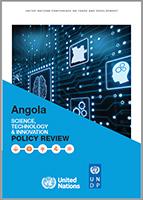
The Government of Angola seeks to stimulate entrepreneurship and innovation, to foster innovative businesses and create jobs for the young population. In this context, in 2021, the Ministry of Higher Education, Science, Technology and Innovation and the United Nations Development Programme Angola requested support from UNCTAD in the preparation of a study on innovation and entrepreneurship in Angola.
The study represents a necessary step in policy development and in collecting information to be made publicly available to actors in the national innovation system.
UNCTAD has extensive experience in preparing such diagnostic studies as part of its programme on science, technology and innovation policy reviews; by end-2021, 17 reviews had been produced, including one of Angola in 2008.
The reviews are an analytical and policy-learning process for national science, technology and innovation stakeholders in understanding the key strengths and weaknesses of the national innovation system and identifying strategic priorities for its development. Results of the process are documented in the review report and considered at sessions of the Commission on Science and Technology for Development.
The present review is focused on the national innovation system, innovative entrepreneurship and a mapping of the national innovation ecosystem and new digital technologies.
Policies under the responsibility of the Ministry of Higher Education, Science, Technology and Innovation are considered, along with all government interventions that have an impact on innovation.
The focus on innovation is directly linked with economic diversification, namely, the expansion of productive capacities, to produce goods and services that are new to the country, and the associated generation of jobs.
The review is based on relevant data and on interviews with 33 representatives of the Government, the private sector, academia and specialized public institutions, conducted in two phases in April–May 2021 and October 2021–January 2022, most of which were conducted online.
The interviews received the full support of the Ministry of Higher Education, Science, Technology and Innovation, the United Nations Development Programme Angola and other stakeholders.


